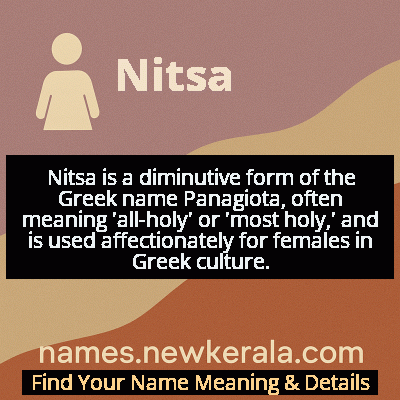Nitsa Name Meaning & Details
Origin, Popularity, Numerology Analysis & Name Meaning of Nitsa
Discover the origin, meaning, and cultural significance of the name NITSA. Delve into its historical roots and explore the lasting impact it has had on communities and traditions.
Name
Nitsa
Gender
Female
Origin
Greek
Lucky Number
9
Meaning of the Name - Nitsa
Nitsa is a diminutive form of the Greek name Panagiota, often meaning 'all-holy' or 'most holy,' and is used affectionately for females in Greek culture.
Nitsa - Complete Numerology Analysis
Your Numerology Number
Based on Pythagorean Numerology System
Ruling Planet
Mars
Positive Nature
Generous, passionate, energetic, and humanitarian.
Negative Traits
Impulsive, impatient, moody, and can be overly emotional.
Lucky Colours
Red, maroon, scarlet.
Lucky Days
Tuesday.
Lucky Stones
Red coral, garnet.
Harmony Numbers
1, 2, 3, 6.
Best Suited Professions
Military, sports, philanthropy, leadership roles.
What People Like About You
Courage, energy, leadership, generosity.
Famous People Named Nitsa
Nitsa Mattheou
Cypriot singer and actress
Popular Greek-Cypriot performer known for traditional and contemporary Greek music
Nitsa Kouloumbi
Greek actress
Prominent Greek theater and television actress with numerous stage performances
Nitsa Stamataki
Greek singer
Known for her contributions to Greek folk and popular music
Name Variations & International Equivalents
Click on blue names to explore their detailed meanings. Gray names with will be available soon.
Cultural & Historical Significance
Extended Personality Analysis
People named Nitsa are typically characterized by their calming presence and diplomatic nature. They possess an innate ability to diffuse tense situations and bring people together, often serving as natural mediators in conflicts. Their peaceful demeanor is not passive but rather reflects a conscious choice to approach life with compassion and understanding. Nitsas tend to be highly intuitive and emotionally intelligent, able to read subtle social cues and respond with empathy. They value deep, meaningful relationships and often become the confidants and emotional supports in their social circles. Creative expression comes naturally to many Nitsas, who may excel in artistic pursuits that allow them to explore themes of beauty, harmony, and emotional depth. While generally gentle and accommodating, they demonstrate remarkable resilience and inner strength when their core values or loved ones are threatened. Their peaceful nature is balanced by a quiet determination and moral courage that enables them to stand up for what they believe in without resorting to aggression or conflict.
Modern Usage & Popularity
In contemporary naming practices, Nitsa maintains a steady presence particularly within Greek communities and families with Hellenic heritage. While not ranking among the most popular Greek names in recent decades, it continues to be chosen by parents seeking traditional names with positive meanings and cultural significance. The name has experienced mild fluctuations in popularity, often influenced by cultural trends toward either modern international names or a renewed interest in classical Greek names. Among the Greek diaspora in countries like the United States, Canada, and Australia, Nitsa serves as a meaningful connection to cultural roots while remaining accessible to non-Greek speakers. The name's appeal in modern times lies in its combination of cultural authenticity, pleasant phonetics, and the universally valued meaning of peace. Recent years have shown a slight increase in usage as parents increasingly seek names with positive meanings and cultural depth rather than merely fashionable sounds.
Symbolic & Spiritual Meanings
The symbolic meanings of Nitsa extend far beyond its literal translation of 'peace.' It represents the philosophical concept of inner harmony and the integration of opposing forces into balanced wholeness. Symbolically, the name connects to the ancient Greek ideal of sophrosyne (σωφροσύνη) – the virtue of excellence of character and soundness of mind, encompassing self-control, moderation, and harmony. In natural symbolism, Nitsa evokes images of calm seas after storms, representing the human capacity for resilience and restoration. The name also carries connotations of the olive tree – an ancient Greek symbol of peace, wisdom, and prosperity that remains deeply embedded in Mediterranean culture. Psychologically, Nitsa symbolizes the journey toward self-actualization and emotional maturity, where conflicting aspects of personality are reconciled into a peaceful whole. In spiritual contexts, the name represents the quest for enlightenment and inner peace that transcends external circumstances, making it a powerful symbolic choice for those valuing personal growth and spiritual development.

